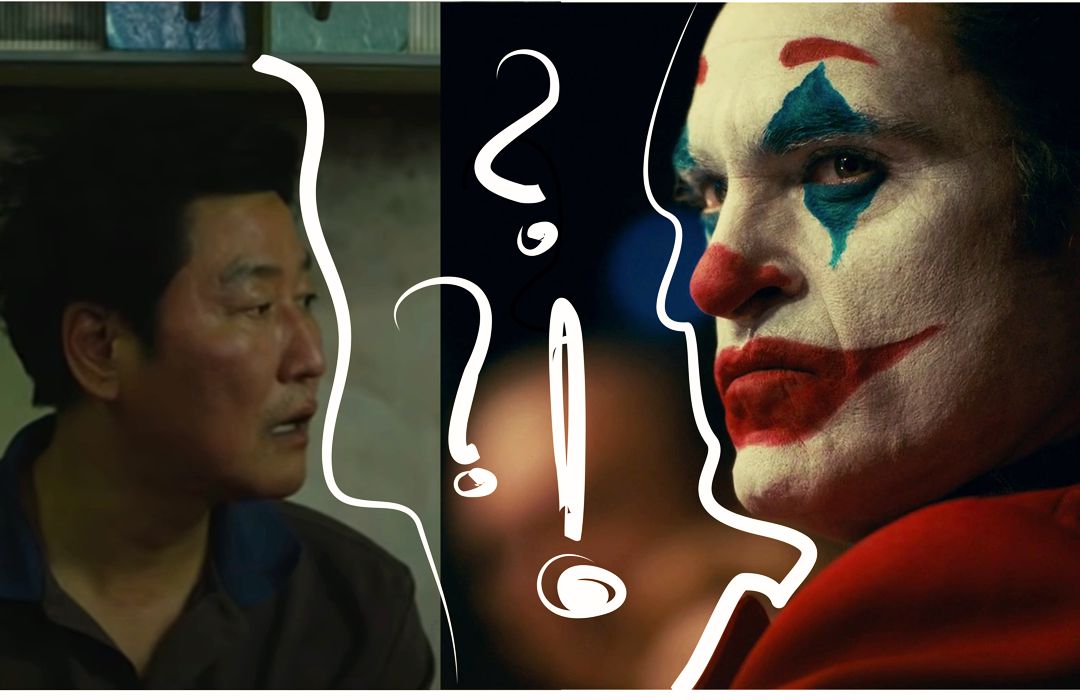
While Joker depicts the anti-capitalist rebellion as merely an aesthetic dead-end event, led by a madman on a killing spree, Parasite constructs a figure of the working class that does not attempt a rebellion when crushed by the system.
by Jana Tsoneva
Collage by the IotL Magazine
Spoilers alert!
[dropcap]W[/dropcap]ith Joker and Parasite both clinching Oscars this year, a pronounced ‘critical’ turn seems to be making it into the cinematic mainstream. Both films have been received and celebrated as poignant critiques of neoliberal capitalism, the associated widening inequalities and utter frustration of social mobility.
Contrary to the proverbial leftist cliché about popular cinema as distracting from, and blunting class struggle, these are films that strip naked with surgical precision the meritocratic order of its founding illusions, revealing the brutal reality of ordinary people barely eking survival in a rigid class structure and under constant humiliation. But while the damning depiction of capitalism and class society offered by both movies is painfully accurate, they offer little imaginative proposals for escaping our predicament.
Far from encouraging rebellion, both films offer a portrait of the working class’ desired, if frustrated, integration with the elites of capitalist society, and identification with its central values. And when such identification fails, it is because of the degeneration of the hero into a full-blown psychopath.

Part 1. Joker: a Film that Delegitimizes Protests and Revolutions
Let’s start with Joker. It has been received warmly by critics on the Left as well by the audiences. No greater recognition of the movie’s influence can be found than in protesters the world over adorning themselves with Joker’ signature make-up and paraphernalia in order to tell the bosses and the state that enough is enough.
Joaquin Phoenix makes a riveting appearance as the frustrated, mentally disturbed clown who inadvertently starts a class war. The film offers a most realistic and nakedly brutal depiction of the horrors of capitalist society, only to crush the painstakingly built connection between the structural violence of capitalism and the subjective violence of Joker under a wimpish conservative explanation: that of the absent father.
What’s the point of depicting so poignantly the undignified work, the humiliating gutting of social services, the business-friendly handling of the New York fiscal crisis, the lack of prospect, the poverty, the violence of the rich and the bosses, the alienation, the austerity measures and the restructuring of the state, and related brutalities meted out on labor suffering the birth-pangs of neoliberalism—when it turns out that the history of his mother’s mental illness and the physical abuse he suffered at the hands of her boyfriend are the root cause of his violent responses? Psychologically traumatised as he was, wouldn’t have he acted the same in a fairer society?
What’s the point of depicting so poignantly the conditions of unfair society, when it turns out that the root cause of Joker’s violent responses was the history of his mother’s mental illness and the physical abuse he suffered at the hands of her boyfriend?
One answer I can think of is that the film tries to delegitimize protests and revolutions: on the surface it may appear as if those who rebel have legitimate reasons, but in reality, it exposes them as just crazy, violent persons acting out the trauma of their childhood abuses.
The murders sequence follows exactly this logic: while the young Wall Street bankers appear to have deserved their fate—and Joker’s imaginary hooking up with the neighbor after murdering them pointed to the emancipatory force of class war—the purely gratuitous murders of his ex-colleague, his neighbor, and his psychologist later on point to a rapid evacuation of reason behind the violence.
Joker: the Aesthetic Leader
The depiction of the rioting ‘crowd’ towards the end was also quite conservative. They literally elected a leader who, by his own admission on TV, is totally apolitical and “doesn’t believe in anything” (in response to Murray’s question on whether wearing the clown mask signals his belonging to the protests.)
In addition, as a leader, Joker is a narcissistic psychopath. As someone who doesn’t hold speeches as normally expected during rallies but dances to cheering applause, he is an aesthetic, rather than political leader. His leadership reflects a neat LeBonian figuration of the crowd as mindless, crazy, manipulative, lacking in reason, engaging in gratuitous violence and being incapable of rational political action. In this regard, I fail to understand how the movie generated a moral panic that it can incite mass violence; like Bane, the film is an explicit condemnation of direct action; it tells us, “yes, life under neoliberal capitalism is abysmal but rioting is even worse” and thus promotes the benign centrism of gradual reform.
The film is an explicit condemnation of direct action; it tells us, “yes, life under neoliberal capitalism is abysmal but rioting is even worse” and thus promotes the benign centrism of gradual reform.
Joker’s surname is very aptly Fleck. He is a stain who wants to become somebody, to be a TV celebrity and a successful comedian. He revels briefly in his mother’s fantasy that his absent father is Wayne: someone rich and famous, capable of lifting him and his mother out of their abject poverty. At some point he imagines the famous TV host Murray as an ersatz-father. Rather than a revolutionary, he is someone who identifies with the system and resents being on its margins.

Yet, precisely in his identification with the central values of the system, he gives the impending class war its compelling aesthetic form. And despite his own political nihilism, he becomes the leader of the nascent movement, which is welcome inasmuch as our movement should make it possible for people with mental health issues to assume leadership. Only in this case the so-called revolution fails. Joker is locked away in a psych ward and Batman is born to help maintain the capitalist order of Gotham, presumably restored after Joker’s meteoric rise and fall from revolutionary anti-politics.
Winning the Battle but Losing the Class War
It was sad but also instructive how, despite losing the particular battle, the rich actually win the war. I am talking here about Wayne who lost his life, yet Joker lost his whole life narrative and felt compelled to accept the narrative frame of his ex-future father.
Rather than a revolutionary, he is someone who identifies with the system and resents being on its margins.
As the late sociologist Pierre Bourdieu says, one of the ways through which the dominant classes dominate is by reducing the objective state of the world to their subjective intentions. They do so by controlling the means of representation.
The dominated live an alienated public existence where the only available images of themselves are produced by the dominant—and Joker is a case in point. This is true of the Joker even within the plot when it transpired that Arthur Fleck didn’t control his own life-story, with the state corroborating Wayne’s version about his mother’s lies and delusions, leading him to the point of killing her.
So, even if Wayne died, his version of the story, even down to the most intimate and personal life history of Joker himself, prevailed and Fleck’s personality unraveled at its seams. Because what is our sense of personality but the (illusion) of a goal and trajectory, uniting the disparate sequence of contingent life-events into a meaningful story geared towards some significance as opposed to meaninglessness? And his was a life that barely had any meaning.
The note “I hope that my death makes more cents than my life” a pure stroke of genius. It captures both the painful lack of sense and also his desire for full integration with the circuits of capital, specifically showbiz.
In that sense, I found the Freudian slip in his diary “I hope that my death makes more cents than my life” a pure stroke of genius. The mistake is only apparent. The sentence captures both the painful lack of sense and also his desire for full integration with the circuits of capital, specifically showbiz. At the end he achieved what he wanted: infamy rather than changing society. Paradoxically, he incited a revolution in the process.
This is the sad truth about our revolutionary hero, despite the anti-capitalist moments and actions beyond the murder of the Wall Street jerks. And in such moments the film abounds; the most anti-capitalist scene for me was when he ‘punched out’ by destroying the office clock, the main tool for enforcing capitalist work-discipline.

Part 2. Parasite: Dreams of ‘Making It’
In Parasite we have a somewhat similar situation of identification with society’s central values on part of the excluded and exploited. It is a story of crushing déclassement and impossible upward social mobility, frustrated by Korea’s neoliberalism.
The poor Kim family, living in a semi-basement apartment, gets itself employed by the rich Park family as tutors, driver and housekeeper on forged credentials and expert confidence tricks. They engineer the ouster of Parks’ previous servants, leading to a bloody war with the ex-housekeeper and her husband who hides in the Park’s basement.
The working-class families in the movie (the Kims and the ex-housekeeper Moon-gwang and Geun-se) had experienced déclassement: downward social mobility. As Max Balhorn explains, Korean neoliberalism put an end to the secure, life-long corporate employment and many workers used their severance money to start a small business. This resulted in an explosion of fried chicken and castella joints. The burst of these bubbles sent the Kims and the housekeeper’s husband to the semi-basement and the basement, respectively. Understandably, the Kims want out of the basement.
The working-class families in the movie (the Kims and the ex-housekeeper Moon-gwang and Geun-se) had experienced déclassement: downward social mobility.
Much like Arthur Fleck daydreamed about being a famous comedian or at least the son of the famous TV host, dreams of integration and social mobility also motivated the Kim family. For example, the son, Ki-woo, who becomes the English-language tutor for Park’s daughter Da-hye, downplays the forgery of his university diploma by saying that he plans to enroll in the university anyway.
The Kims might have started their career in the employ of the Parks as ‘con artists’, yet that emboldened them to ‘dream big’ of actually making it one day for real. For example, in the scene where the Kims get drunk in the absent Parks’s living room, Ki-woo reveals his fling with Da-hye and fantasizes how it can result in marriage and a literal assimilation in the rich family. This triggers a collective family daydreaming of how, one day, they could own the beautiful house.
Class and Space & Class as Space
The house architectonics is central to the ploy, not only providing the scene where dreams and aspirations play themselves out but as a spatial metaphor for social class, dear to sociologists. Social class manifests itself in concrete spaces governed by complex social codes for inclusion and exclusion.
The rich tend to cluster in more prestigious areas of town, have access to well-paying jobs and exclusive universities. And these perks tend to reinforce each other. Pierre Bourdieu liked to quip of “the Harvard accent which opens all doors, including those of Harvard”. Despite the illusions of social mobility which meritocratic societies entertain about themselves, poverty as well as richness is inherited and those that make it to Harvard are also those who are best inclined by the class structure to ‘feel at home’ there.
Social class manifests itself in concrete spaces governed by complex social codes for inclusion and exclusion.
As Bourdieu says, we are bodies in space, subject to social laws governing the distribution of bodies. Such laws govern even those events in life we tend to experience as blind and happy accidents, such as love. What are the chances that a university graduate from the ‘better part of town’ with a decent job will end up marrying an opioid user that often ends up sleeping rough? Space is thus a crucial element in the analytic of class because the spaces we occupy not only express our position in the class structure but help reproduce it.
The film is very attentive to the spatial dynamic of social class. Most of the action splits between the spaces of Park’s luxury home and the shoddy semi-basement apartment of the Kims. They are worlds apart (read Eileen Jones’s vivid description of spaces) yet the capitalist class structure cannot fully maintain the gaps that separate the determinate spaces of the different classes.

Rich owners like the Park family try to maintain their distance from but they need the workers like the Kims to drive them around, maintain their luxury lives, take care of their homes and kids. Because no matter how hard neoliberal entrepreneurialism tries to rid itself of the workers, they come back, in the underbelly of its basements. There is no capitalism without workers.
No matter how hard neoliberal entrepreneurialism tries to rid itself of the workers, they come back, in the underbelly of its basements.
The uneasy dialectic of proximity and distance was most obvious in the figure of the husband hiding from his creditors in Parks’ basement. Keeping the poor at bay is like repression; the repressed returns either as a spectral presence, like the “ghost” in the basement, whom Da-song encountered in terror, or in the guise of a full-blown class war when the suppressed antagonisms cannot find an institutional outlet any longer and explore undeterred.
The film thus reveals the violence of post-Fordist capitalism and its entrepreneurial ideology that represses not only class struggle but the very notion of class. We are told to believe that classes are a thing of the past and there are only ‘utility-maximising’ individuals deploying on the market with varying success the different stands of capital they are endowed with.
Naturally, this class-consciousness blunting ideology targets mostly workers and their offspring while the rich have a good sense (if not always awareness) of class and vigorously maintain class distinctions.
Class-consciousness blunting ideology targets mostly workers and their offspring while the rich have a good sense (if not always awareness) of class and vigorously maintain class distinctions.
In Parasite this is shown with surgical precision. For example, when the two fathers got to entertain the birthday boy, Kim asked too personal of a question, which Park brutally answered by reminding him that he is not a friend but should treat his presence at the birthday party as part of his job duties, for which he shall be compensated accordingly. Park reasserted the cold brutality of the employment relation against the intimacy of Mr. Kim’s ‘cross-class humanism’. This was a rare instance of Kim ‘trespassing’ into Park’s space, who usually praised him for “not crossing the [class] line”.
Class and Embodiment
Except Kim’s bodily odor. The scene where the Parks discussed Mr. Kim’s smell, overheard by the entire family, hinted at a crucial aspect in the analysis of class: the embodiment of the class structure.
We are embodied beings and the class system is not only an objective structure above us; it is, so to speak, also beneath the skin, within our very bodies. It is held in place by the legal administrative moorings of bourgeois society, but the system wouldn’t be sustainable if it were maintained by legal and institutional coercion alone; it also gets reproduced and is taken for granted with every gesture and choice we make as we go about in our everyday lives.
The scene where the Parks discussed Mr. Kim’s smell, overheard by the entire family, hinted at a crucial aspect in the analysis of class: the embodiment of the class structure.
The way we ‘carry ourselves’ in the particular spaces the class system relegates us to (some to the hidden abodes, be them basements or shop floors, others in better parts of town) reproduces the class system in its everyday ‘minutiae’. The Kims try to cheat the system but their bodily smell gives them off, as in the scene where the youngest Da-song said, “they all smell the same”. Of basement humidity.
I dwell on this moment because it resonates with my earliest experience of class domination and humiliation.
I come from a declasse bourgeois family which was completely expropriated during socialism, but some branches of the family quickly regained the upper hand in the 1990s. I used to play with a cousin when we were little and her parents always wrinkled their nose when I showed up because, unlike their clean and proper middle-class household, I lived in one where my parents smoked, drank, and the house was unkempt making me embarrassed to have friends over. The smoke etched our social position on my skin, and I couldn’t hide the smell from my rich relatives. Like the Joker, my embarrassment signaled my acceptance of their standards and their version about my family’s situation, even though it hurt me.
In capturing similar moments of class difference, Parasite offers a superb sociological portrayal of the daily indignities of class domination. This is not surprising given that the director Bong Joon-ho majored in sociology.
Parasite offers a superb sociological portrayal of the daily indignities of class domination. This is not surprising given that the director Bong Joon-ho majored in sociology.
The only less realistic moment in the portrayal of class dynamic was the role of “Jessica”. Unlike her deferring and submissive parents, she seemed way too bossy and direct with her employer for someone who has always been on the receiving end of power relations. However, this might be explained as her being the best con artist of the whole family. She is also the only one of the Kim family who loses her life when the subdued antagonism eventually explodes into an all-out war.
Class Struggles
Which brings me to the portrayal of class struggle in the film. Marx liked to speak of class struggles in the plural, for a good reason. To me, this was a remarkably disheartening moment in the cinematic rendition of the class relations: brutal competition between members of the same class. This is evident in the way the old and the new servant families struggled with each other to defend or regain the privileged position of proximity to the masters. Even physical proximity as in the scene where the husband of the old housekeeper, Geun-se, worshipped the unsuspecting Park father and paid him ‘respect’ (in English!) every day.
Capitalism encourages competition between people occupying similar positions in the class structure. When moving up the social ladder is so ridden with difficulty, you are more likely to defend your hard-one position even at the price of hurting others and crippling their mobility. That explains unfortunate phenomena such as relatively better integrated migrants being unhelpful to, or downright rejecting, of newcomers, perceived as threatening their positions, instead of uniting with them against their common oppressors.
Capitalism encourages competition between people occupying similar positions in the class structure. When moving up the social ladder is so ridden with difficulty, you are more likely to defend your hard-one position even at the price of hurting others and crippling their mobility.
The only instance of struggle with the antagonistic class was after Park displayed disgust at the bodily smell of Geun-se—reminding Kim of his boss’ disdain for his own bodily odour. But even then, there was a brief moment of hesitation when Park commanded Mr. Kim to drive quickly Da-song to hospital, while he was tending to his dying daughter. For a second Mr. Kim was almost about to submit to the order and only attacked Park when the latter forced himself to approach the dead smelly body of Geun-se (killed by Mr. Kim). Even though Mr. Kim killed his boss, he also killed his fellow worker. And then took his place in the basement—much like his wife took Geun-se’s wife’s place as a housekeeper before that.
Nature and Class
Just as the Kims were at their most confident in their smooth integration in the world of the Parks, symbolized by their freely getting drunk in the house, came the storm. The torrential rain revealed how class shapes the experience of nature in incommensurate ways: while for the Parks it merely postponed their mountain hike, the Kims (and others in their position) almost lost their basement, being completely defenseless against the deluge. While Yeon-kyo, Park’s gullible wife welcomed the rain for having cleared the pollution from the air, for people like the Kims, the rain portended the destruction of their dreams and the little they’ve got.

Further, we have a figure of nature that not only reveals the class-mediated experience of such events, but actively reproduces the class order in putting everyone back in their place. The Kims left the house precisely in the rain which was the backdrop of events that triggered the dissolution of the fantasy of ‘making it’. Was the impending calamity not signaled by the arrival of the drenched ex-housekeeper, triggering the quick downfall (and physical destruction) of both poor families?
We have a figure of nature that not only reveals the class-mediated experience of such events, but actively reproduces the class order in putting everyone back in their place.
Nature was made to point to the immutability of the class structure.
Films Rebelling Against Capitalism? Not Quite
Both films offer a damning depiction of neoliberalism: one of its nascent stages (Joker), the other of its more ‘mature’ phase. Despite the superb portrayals of the brutality, stagnation and hopelessness of capitalist society, both films are fundamentally pessimistic about finding ways out.
While Joker depicts the anti-capitalist rebellion as merely an aesthetic dead-end event, led by a madman on a killing spree, Parasite constructs a figure of the working class that does not attempt a rebellion when crushed by the system but tries to find its way back in as con men. And when the stratagem fails, only the dream remains.
While Joker depicts the anti-capitalist rebellion as merely an aesthetic dead-end event, led by a madman on a killing spree, Parasite constructs a figure of the working class that does not attempt a rebellion when crushed by the system.
The last scene, which was especially gut-wrenching, is Ki-woo dreaming of having made it and having bought Park’s house legitimately. This scene revealed the ultimate defeat of the Kims: after having failed to move up the social ladder either through ‘honest work’, entrepreneurship and finally, lying and forging, they succumb to the empty meritocratic delusions of capitalism that education and hard work always pay off.
The dream-scene ends with one last shot from the basement apartment driving home the point that there is no escaping the basement. And if you dare rebel, as in Flecks’s case, you end up worse-off: swapping the shoddy apartment with the totalitarian setting of criminal-psychiatric care.

Jana Tsoneva has PhD in sociology at the Central European University. She works in the fields of political and economic sociology and is a member of the Collective for Social Interventions, Sofia.
Leave a Reply